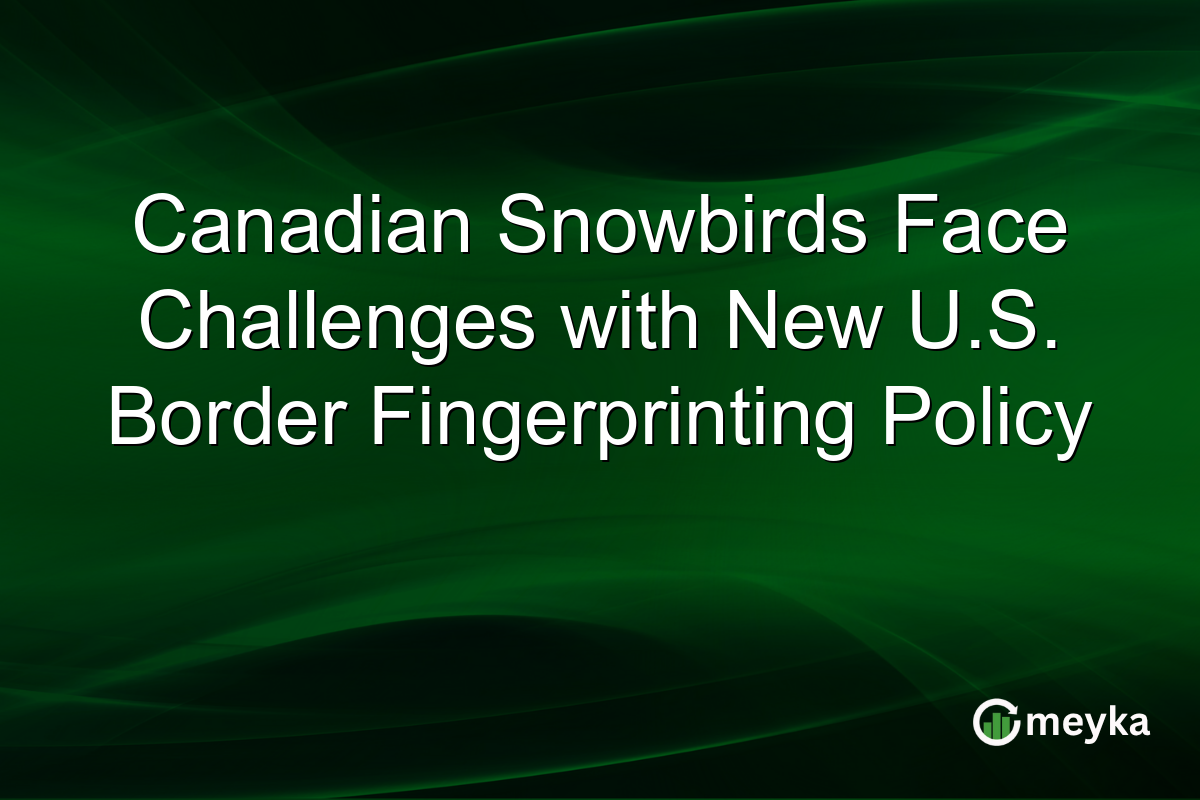Canadian Snowbirds Face Challenges with New U.S. Border Fingerprinting Policy
Today, many Canadian retirees known as ‘snowbirds’ are encountering significant changes at the U.S. border due to a stricter fingerprinting policy. This latest measure has sparked concerns among Canadian travelers regarding privacy issues and the potential implications for tax compliance and healthcare access. As this policy unfolds, it is crucial for snowbirds and their legal advisors to stay informed and prepared.
Understanding the New Fingerprinting Policy
As of 2025, the U.S. Customs and Border Protection has begun implementing more rigorous fingerprinting procedures at various entry points. This change is a part of enhanced security measures aiming to monitor cross-border travel more effectively. For many Canadian snowbirds, this shift raises questions about how their data is used and stored, underscoring the need for transparency in governmental processes.
According to a recent article on Bloomberg, these rules have been enforced to safeguard against immigration violations and ensure compliance with visa regulations. While the rationale is rooted in security, the personal impact on snowbirds warrants attention. Bloomberg News provides further insights.
Implications for Tax Compliance and Residency
The implications extend beyond privacy concerns; tax compliance and residency status are also at stake. Snowbirds frequently split their time between Canada and the U.S., which requires strict adherence to residency rules. The new fingerprinting measures may facilitate more accurate tracking of time spent in the U.S., affecting tax obligations and residency determinations.
As reported by Reuters, the shift also signals a potential for increased collaboration between U.S. and Canadian tax authorities, highlighting the need for retirees to maintain meticulous travel records. Reuters explores these tax implications in depth.
Impact on Cross-Border Healthcare Access
Healthcare access remains another significant concern. Many snowbirds rely on Canadian healthcare benefits while spending extended periods in the U.S. The enhanced border procedures could complicate eligibility for these benefits if time spent abroad is closely monitored.
Additionally, as travel restrictions evolve in 2025, retirees might face new challenges in accessing necessary care both in Canada and the U.S. This underscores the importance for snowbirds to revisit their healthcare plans and ensure they meet the criteria for benefits on both sides of the border.
Planning Ahead: Legal and Financial Strategies
Given these changes, snowbirds must carefully plan their cross-border trips. Engaging with immigration and tax professionals is critical to navigating these new requirements. Legal advice can help retirees understand the nuances of border entry rules and maintain compliance with both U.S. and Canadian laws.
Financial planners can also assist in managing assets dispersed across borders and ensuring compliance with international tax laws. Proactive planning and staying informed of travel restrictions in 2025 will be crucial for snowbirds aiming to enjoy their retirement without unexpected legal or financial challenges.
Final Thoughts
The intensified fingerprinting at the U.S. border represents a significant shift for Canadian snowbirds. Privacy concerns, tax compliance, and healthcare access are all areas impacted by these changes. For retirees who plan to journey south each winter, understanding these dynamics is essential.
Consulting with legal and financial professionals can provide the necessary guidance to navigate these complexities. By staying informed and prepared, snowbirds can ensure a smoother transition across borders. As these policies develop, open communication with policy makers could also play a role in easing these challenges in the future.
FAQs
The policy involves collecting biometrics, raising concerns about data storage and use. It’s important for snowbirds to understand how their information is handled to address privacy issues.
Tighter monitoring of entry could affect tax status, as time in the U.S. impacts residency and tax obligations. Snowbirds should keep detailed travel records and consult tax professionals.
Increased scrutiny may complicate eligibility for Canadian healthcare benefits if travel exceeds allowed durations. Snowbirds should review healthcare plans to ensure coverage compliance.
Disclaimer:
This is for information only, not financial advice. Always do your research.






